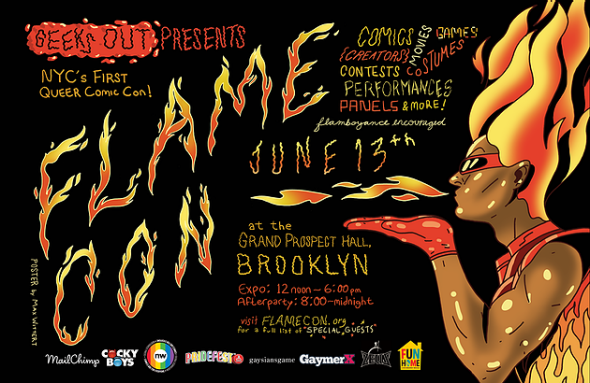On June 13, the queer comic book collective Geeks OUT will launch Flame Con—New York City’s first LGBTQ comic convention. Held in Brooklyn’s opulent Grand Prospect Hall, the event will feature comics, film screenings, performances, and “celebrities from all corners of LGBTQ geek fandom.”
When I first heard about Geeks OUT and Flame Con, I, well, geeked out. As a drag queen whose first beauty icons were the super-heroines in her father’s Marvel collection, I have always felt alone in my love of the comic universe. Sure, I’ve met a few gays who claimed to be superhero junkies like me, but most of them knew only what they’d learned from recent blockbusters like Iron Man. Flame Con will offer a chance to meet real queer geeks—and to ask a question that’s been on my mind: How can comic books made for straight boys mean so much to a gurl like me?
Last week, I talked about this with Joey Stern, a founding member of Geeks OUT and a leading organizer of Flame Con. As he gears up for the convention, he, too, has been thinking about what comics mean to queer people, and what they have meant to him in particular. As he sees it, comics are more than just entertainment for gay readers—especially for younger fans grappling with a sense that they are somehow different. “When I was a kid I developed a passion for reading, and I loved the philosophical debates in comics like X-Men,” he said. “I loved the message that you can be different, and special, but conflicted about that. Comic books gave me a way to see that in myself.”
Before talking with Stern, I assumed that I’d loved comic books for the spandex outfits, but his words brought back memories. In third grade, my father allowed me to read his collectors’ edition comics as long as I kept them flat on my desk and turned each page from the bottom corner. Reading The Uncanny X-Men, I remember feeling a deep affinity for the titular mutants, most of whom had been forced to hide their true nature for years before finding an accepting home. And though many X-Men issues were missing from my father’s collection—he had sold them to escape his own nightmare childhood—I knew each mutant’s story as if they were my siblings. I was hooked on them because they’d managed to find power despite being outcasts. If it could happen for them, maybe it would happen for me.
For so many young LGBTQ readers, comics become a form of therapy—and then a way of life. For author Jennie Wood, who will showcase her work at Flame Con, her early love of comics led to a career. “I didn’t have a happy home life, so every minute of my first 18 years was about getting out,” Wood told me. “I was drawn to superheroes as a way to escape my life and feel less powerless.” Now Wood is creator of Flutter, illustrated by Jeff McComsey, the story of a girl who shape-shifts into a boy in order to snag the girlfriend of her dreams. Described by The Advocate as one of the best LGBT graphic novels of 2013, Flutter is, in part, a working out of Wood’s early personal struggles. “As a teen, I worked at a theater and had to watch my male cousins bring their dates to the movies,” Woods says. “A lot of Flutter comes from being fifteen, watching them, wishing I could do what they did.”
I don’t meant to suggest that gay audiences love comic books only because of dismal childhoods. Comic books provided Woods with a much needed escape, definitely, but they’ve become more than that for her over the years. She uses her graphic novels not only as a form of wish fulfillment, or a way to tell her personal story, but also as vehicles for her political wit, her skepticism about gender norms, and a way to raise questions about the unequal treatment of young boys and girls.
And some queer comic fans and authors see queer and gender issues as just one small part of the picture. For Flame Con artist Max Wittert, who grew up in an accepting liberal home and community, comics are not needed as a form of therapy or a way to discuss gay subject matter. His hilarious Jean & Scott comics feature heterosexual characters—Jean Grey and Cyclops of the X-Men—modeled after his quirky room mates, rather than scenes from his early years. “Art has never been an escape for me in that way,” Wittert told me. “And I don’t want to be typed as someone who does only that kind of work—I want to reach out to as many people as possible.”
Whatever their reason for connecting with comic books, LGBTQ comic fans and authors alike will find Flame Con an important event. They’ll be able to showcase and share material without odd stares or patronizing gestures from uncomfortable straight convention goers. They’ll be able to revel in the diversity of queer geekdom. And, as Stern points out, they’ll enjoy a moment of queer community that breaks down the usual boundaries. “Flame Con will be a very different interaction than a bar,” Stern said, “It won’t be based on body shape or body size. It will be a chance to learn about creators and artists.”
Geeks OUT is a 501(c)3 nonprofit organization dedicated to rallying, empowering, and promoting the queer geek community. FLAME CON will be held on Saturday, June 13, 2015 at the Grand Prospect Hall in Brooklyn.
